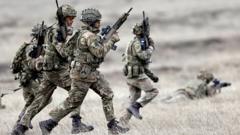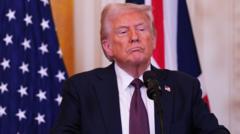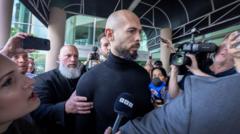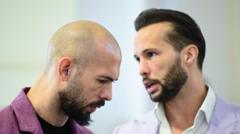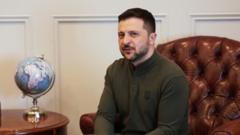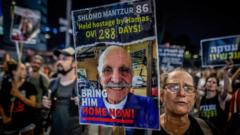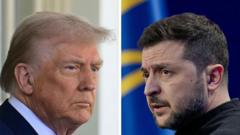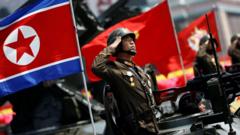Russian Foreign Minister Lavrov emphasizes the unacceptability of foreign armed intervention while expressing cautious optimism regarding future discussions with the US.
**Russia Rejects NATO Peacekeeping Forces in Ukraine Amid US Talks**
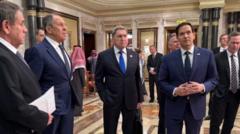
**Russia Rejects NATO Peacekeeping Forces in Ukraine Amid US Talks**
Russia firmly states it will not accept NATO troops in Ukraine despite ongoing negotiations with the United States.
In a recent development following high-level discussions between Russia and the US in Saudi Arabia, Russian Foreign Minister Sergei Lavrov declared that Russia will not accept any peacekeeping forces from NATO countries in Ukraine as part of a potential peace agreement. “Any appearance by armed forces under some other flag does not change anything. It is, of course, completely unacceptable,” he insisted.
The talks marked the first known face-to-face meeting between Russian and American officials since Russia's full-scale invasion of Ukraine. US Secretary of State Marco Rubio, who attended the meeting alongside National Security Advisor Mike Waltz and Middle East envoy Steve Witkoff, stated that the two nations have agreed to form teams aimed at negotiating an end to the conflict. Rubio described the current moment as "the first step of a long and difficult journey, but an important one.”
Notably excluded from the negotiations was Ukraine, a surprising omission that President Volodymyr Zelensky responded to during a press conference in Turkey. “We want everything to be fair and so that nobody decides anything behind our back,” he commented, clearly disturbed by the lack of Ukrainian representation in crucial discussions regarding its sovereignty.
The meeting in Riyadh also involved Russian presidential aide Yury Ushakov and Kirill Dmitriev, head of Russia's sovereign wealth fund. Lavrov also indicated that both countries are set to appoint ambassadors to one another as soon as feasible. He reiterated Russia's long-standing view that further NATO expansion, particularly Ukraine’s accession, poses a “direct threat” to Russian security.
While Rubio has expressed "conviction" that Russia is ready to engage seriously in the resolution process, he acknowledged that there would need to be concessions from all parties involved. European leaders held an urgent meeting in Paris to evaluate their stance on the recent developments, finding themselves divided on the appropriate response, with some calling for a "US backstop" to deter further Russian aggression.
Chancellor Olaf Scholz from Germany remarked that the idea of sending troops to Ukraine is currently “completely premature,” pointing to the complexity surrounding European security decisions. Meanwhile, Rubio emphasized the necessity of including the European Union in future discussions, noting their stake due to imposed sanctions on Russia.
The tone of the Riyadh meeting, which featured smiles and positive interactions between American and Russian delegates, has left Ukraine fearful of being sidelined in discussions that directly impact its future. Zelensky is acutely aware of the dire circumstances Ukraine faces in resisting Russian advances without continuous support from the United States.

